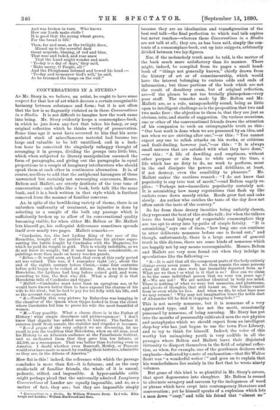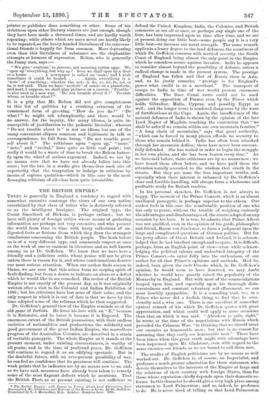CONVERSATIONS IN A STUDIO.*
As Mr. Story is, we believe, an artist, he ought to have some respect for that law of art which decrees a certain recognisable harmony between substance and form ; but it is not often that the law is so flagrantly violated as in these Conversations in a Studio. It is not difficult to imagine bow the work came into being. Mr. Story evidently keeps a commonplace-book, in which he jots down any fact that takes his fancy, or any original reflection which he thinks worthy of preservation. Some time ago it must have occurred to him that his accu- mulated stock of miscellaneous material had become too large and valuable to be left unutilised, and in a luck- less hour he conceived the singularly unhappy thought of arranging it in groups, dividing the groups into little bits, which when subjected to literary manipulation assumed the form of paragraphs, and giving out the paragraphs in equal proportions to a couple of imaginary interlocutors who should speak them at each other in continuous alternation. It is, of course, needless to add that the antiphonal harangues of those unwearied but certainly not unwearying conversers, Messrs. Belton and Mallett, are utterly destitute of the true tone of conversation : each talks like a book, both talk like the same book, and it is a book written in that style which is furthest removed from the manner of familiar converse.
As, in spite of the bewildering variety of theme, there is an unbroken uniformity of treatment, no injustice is done by selecting as a sample of the bulk any passage which is sufficiently broken up to allow of its conversational quality becoming visible, for when either Mr. Belton or Mr. Mallett lets himself go, his colloquial deliverance sometimes spreads itself over nearly two pages. Mallett remarks :—
"Candaules, too, the last Lydian King of the race of the Heraclidm, bought of the painter Bularchus his picture repre- senting the battle fought by Candaules with the Magnetes, for which he paid its weight in gold. This is wholly indefinite, as we do not know its weight; but it must have been considerable, as paintings were then made on heavy wooden panels. "Belton.—It would seem, at least, that even at this early period art was valued. This was, if I remember right [sic], about the end of the eighth century before Christ,—some four centuries before gold began to be coined at Athens. But, as we know from Herodotus, the Lydians had long before coined gold, and were, according to him, the first who did. What a story it is that Herodotus tells of Candaules and Gyges ! " Malieit.—Candaules must have been an egregious ass, or he would have known better than to have exposed the charms of his wife to his rival; but he had to pay for his folly with his life, and so the account was squared.
" B.—Possibly this very picture by Bularchus was hanging in the chamber of the Queen when Gyges looked in from the closet where Candaules hid him to prove his wife the most beautiful of women.
"M.—Very possible. What a charm there is in the Father of History ! what simple directness and picturesqueness ! I don't know that dignity has added much to history. The further it removes itself from annals, the statelier and stupider it becomes.
" B.—A propos of the very subject we are discussing, let me recall to you the tradition that Herodotus, when an old man, read his History to an Athenian audience at the Panathenaic festival, and so enchanted them that they gave him ten talents, or £2,500, as a recompense. That was better than lecturing even in America. I doubt whether even Bancroft, Motley, or Prescott would ever have made so much by reading their histories, admirable as they are, in the Athens of America."
How flat is this ! indeed, the reference with which the passage concludes is more than flat—it is fatuous; and as the easy studio-talk of familiar friends, the whole of it is unreal, pedantic, stilted, and impossible. A hyper-amiable critic might perhaps plead that the universally admired Imaginary Conversations of Landor are equally impossible, and so, as a matter of fact, they are ; but they are impossible simply
•
Conversations in a Studio. By William Wetmore Story. In 2 vols. Edin- burgh and London : William Blackwood and Sons.
because they are an idealisation and transfiguration of the best real talk—the final perfection to which real talk aspires but never reaches—whereas these Conversations in a Studio are not talk at all; they are, as has been said, simply the con- tents of a commonplace-book, cut up into snippets, arbitrarily divided between two lay-figures.
Nor, if the melancholy truth must be told, is the matter of the book much more satisfactory than its manner. There might, indeed, be compiled from its pages a small hand- book of " things not generally known," chiefly drawn from the history of art or of connoisseurship, which would have the interest belonging to curious odds and ends of information ; but those portions of the book which are not the result of desultory cram, but of original reflection, are—if the phrase be not too brutally plainspoken—very poor stuff. The remarks made by Mr. Belton and Mr.
Mallett are, as a rule, unimpeachably sound, being as little open to intelligent challenge as is the proposition that two and two make four : the objection to them is, that they are just as obvious, trite, and sterile of suggestion. On various occasions, one or other of the conversational friends draws the attention of his companion to such an unimpugnable truth as this : " Our best work is done when we are possessed by an idea, and not when we are striving after one,"—or this : " You cannot expect any one to relish attacks on his works, or criticism and fault-finding, however just,"—or this : " It is always small natures that are satisfied with what they have done," —or this : " A life of dawdling and emptiness, without other purpose or aim than to while away the time, a life which has no duty to do, no work to perform, must in the end dissipate the powers and debilitate, at least, if not destroy, even the sensibility to pleasure." Mr. Mallett makes the cautious remark : "I do not know that popularity is any true test of merit,"—and Belton sagely re- plies : "Perhaps not—immediate popularity certainly not. It is astonishing how many reputations that flash up like rockets come down merely sticks. Reeds grow fast and oaks slowly. An author who catches the taste of the day does not often catch the taste of the century."
So far from these dreary inanities being unfairly chosen, they represent the best of this studio-talk ; for when the talkers leave the broad highway of respectable commonplace they are too apt to stray into by-paths of simple fatuity. "It is astonishing," says one of them, " how long one can continue to utter deliberate nonsense before one is found out;" and though, unfortunately, there is a large amount of general truth in this dictum, there are some kinds of nonsense which are happily not by any means unrecognisable. Messrs. Belton and Mallett are very soon found out when they indulge in speculations like the following :—
" B.—It is said that all the component parts of the body entirely change every seven years. Do we then remain the same persons when all that we once were has insensibly departed from us ? What are we then ? or what is it that is we ? How can we claim to be the same individual person that we• were ten years ago ? M.—We are not ! We are neither identical in body nor mind. There is nothing of what we were but memories, and phantasms, and ghosts of thoughts, that still haunt us. Our bodies vanish from us even while we live. And when we die, to what base uses we may return ! Why may not imagination trace the noble dust of Alexander till he find it stopping a bung-hole ?'"
This is not merely nonsense, but it is nonsense of a very aggravated type, and it has not the merit, occasionally possessed by nonsense, of being amusing. Mr. Story has put into the mouths of presumably cultivated men the raw physics and metaphysics which we should expect from an intelligent shop-boy who has just begun to use the town Free Library, and to try to think for himself. Indeed, the voice of this worthy but uninspiring youth is very audible in all the passages where Belton and Mallett leave their disjointed virtuosity to dissport themselves in the field of original reflec- tion, as when, for example, one of the gentleinen declares with emphasis—indicated by a note of exclamation—that Sir Walter Scott was " a wonderful writer ! " and goes on to explain that his wonderfulness lies mainly in the fact that he wrote ninety volumes.
But game of this kind is so plentiful in Mr. Story's covers, that sport degenerates into slaughter. Mr. Belton is roused to alternate savagery and sarcasm by the inelegances of word or phrase which have crept into contemporary literature and
conversation; yet he himself speaks of a euphuism which lets a man down " easy," and tells his friend that "almost no"
printer or publisher does something or other. Some of his strictures upon other literary sinners are just enough, though they have been made a thousand times, and are hardly worth
repeating ; while others which are more novel are hardly likely to be repeated, as the heavy-handed literalness of the conversa- tional friends is happily far from common. More depressing even than this literalness of substance are the elephantine attempts at humour of expression. Belton, who is generally the funny man, says:— "We give ovations' to persons, not meaning rotten eggs. We open up' everything, but why up ? Soon we shall open up a door
or a house A newspaper is called an 'issue,' and I wish sometimes it could be healed Again, everything is a `note' of something ; whether the note is do, re, mi, fa, sol, or la, is not said. Then we have 'recitals' of music on a pianoforte, and next, I suppose, we shall play pictures on a canvas. 'Trouble' is also used in a new way. Do not trouble about it ?' Trouble whom, or trouble what ?"
It is a pity that Mr. Belton did not give completeness to this list of quibbles by a crushing criticism of the
commonest form of greeting, " How do you do ?" " Do what F " he might ask triumphantly, and there would be no answer, for the inquiry, like many idioms, is quite in- susceptible of justification to the pedantic literalist; whereas " Do not trouble about it " is not an idiom, but one of the
many convenient ellipses common and legitimate in talk or correspondence, its full form being, " Do not trouble yaw- self about it." The criticisms upon "open up," "issue," " note," and " recital," have quite as little real point ; but really it would be a waste of time to break the Belton butter- fly upon the wheel of serious argument. Indeed, we are by no means sure that we have not already fallen into this error ; but the two in a studio give themselves such airs of superiority that the temptation to indulge in criticism by means of copious quotation—which in this case is the most damaging criticism of all—has been quite irresistible.







































 Previous page
Previous page